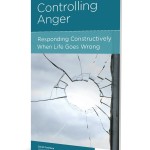Powlison’s booklet is the best starting point to understand the nature of anger and how to express anger in healthy righteous ways. Controlling Anger is published by New Growth Press in partnership with CCEF. It is only fifteen pages and can be downloaded to Kindle. Students and adults will both find it readable. This booklet is a great summary of the Bible’s view of anger and the solutions it provides.
Powlison begins by noting, “Anger needs to be acknowledged and expressed in a positive way, as a form of doing what is good and right.” We become angry when something is important to us and when we believe that something is wrong. Therefore, anger in and of itself is not bad. But, the problem is when we get angry about things that we should not get angry about. Anger can also go wrong when the thing we think is important becomes more important to us than God himself. Anger can also be a problem when we “respond to a true wrong in the wrong way.”
The solution to our anger problems begin with believing God is in charge and thus the judge. This solution is not about superficial techniques and strategies, but about genuinely believing gospel truths. This enables us to make our anger redemptive. God sent his son to die to make right what was wrong. In a similar way we can bear the burden of a wrong and forgive the wrongdoer. Gospel approaches to anger lead to constructive responses. Powlison explains that applying the gospel to our anger leads to patience, mercy, forgiveness, and honesty.
What I find most helpful about Powilson’s booklet is his practical tool to express anger constructively. In short, he calls angry people to go to God for help. When we are angry he tells us to ask ourselves four questions. First, “What is happening around me when I get angry?” This question helps us understand the heart of our anger. Second, “How do I act when I get angry?” This step is also about understanding the nature of our anger especially how we express it in sinful ways. Third, “What were my expectations (what did I want, need, demand) when I became angry?” This question leads us to discover how we are playing God in the situation. Fourth, “What message does God, in his Word, have for me that will speak to my anger?” This drives us to the Bible to find solutions. Finally, Powlison calls angry people to ask God for help. He reminds us that God loves us and desires to change us.
I recommend this booklet as a first step for those struggling with anger. If you struggle with anger, God is loving enough and powerful enough to help. Go to him!
